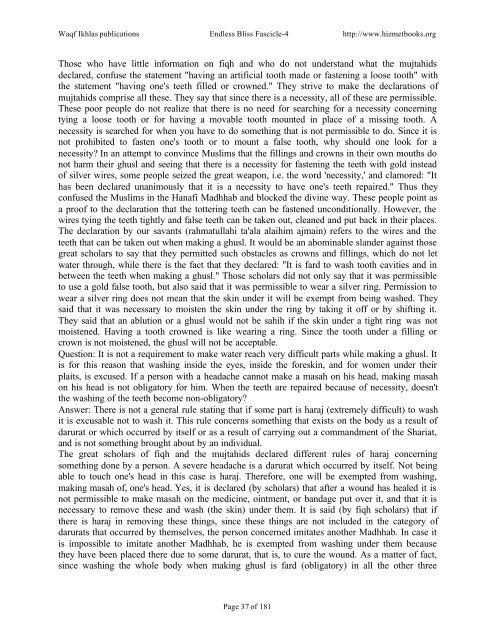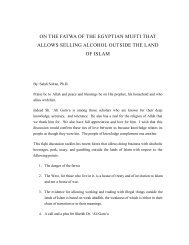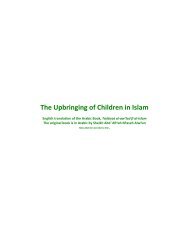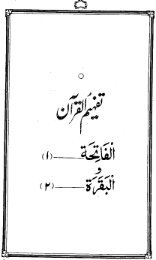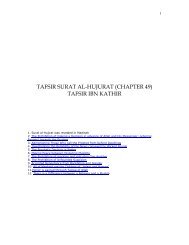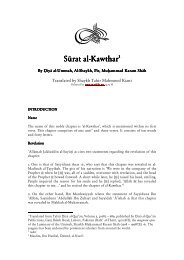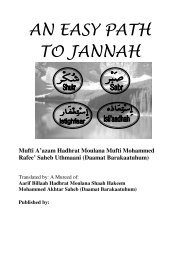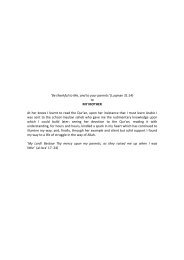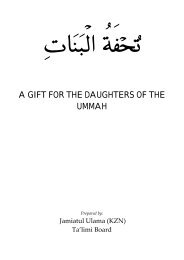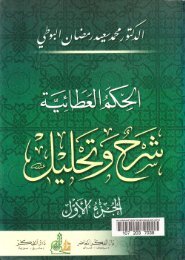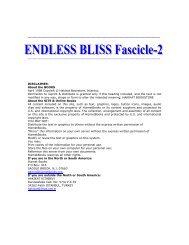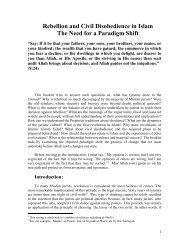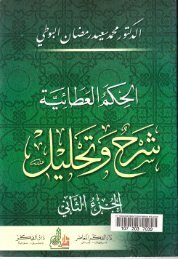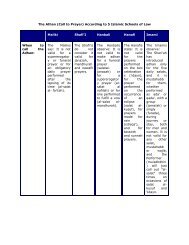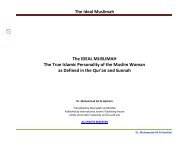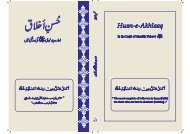ENDLESS BLISS FASCICLE-4
ENDLESS BLISS FASCICLE-4
ENDLESS BLISS FASCICLE-4
Create successful ePaper yourself
Turn your PDF publications into a flip-book with our unique Google optimized e-Paper software.
Waqf Ikhlas publications Endless Bliss Fascicle-4 http://www.hizmetbooks.org<br />
Those who have little information on fiqh and who do not understand what the mujtahids<br />
declared, confuse the statement "having an artificial tooth made or fastening a loose tooth" with<br />
the statement "having one's teeth filled or crowned." They strive to make the declarations of<br />
mujtahids comprise all these. They say that since there is a necessity, all of these are permissible.<br />
These poor people do not realize that there is no need for searching for a necessity concerning<br />
tying a loose tooth or for having a movable tooth mounted in place of a missing tooth. A<br />
necessity is searched for when you have to do something that is not permissible to do. Since it is<br />
not prohibited to fasten one's tooth or to mount a false tooth, why should one look for a<br />
necessity? In an attempt to convince Muslims that the fillings and crowns in their own mouths do<br />
not harm their ghusl and seeing that there is a necessity for fastening the teeth with gold instead<br />
of silver wires, some people seized the great weapon, i.e. the word 'necessity,' and clamored: "It<br />
has been declared unanimously that it is a necessity to have one's teeth repaired." Thus they<br />
confused the Muslims in the Hanafi Madhhab and blocked the divine way. These people point as<br />
a proof to the declaration that the tottering teeth can be fastened unconditionally. However, the<br />
wires tying the teeth tightly and false teeth can be taken out, cleaned and put back in their places.<br />
The declaration by our savants (rahmatullahi ta'ala alaihim ajmain) refers to the wires and the<br />
teeth that can be taken out when making a ghusl. It would be an abominable slander against those<br />
great scholars to say that they permitted such obstacles as crowns and fillings, which do not let<br />
water through, while there is the fact that they declared: "It is fard to wash tooth cavities and in<br />
between the teeth when making a ghusl." Those scholars did not only say that it was permissible<br />
to use a gold false tooth, but also said that it was permissible to wear a silver ring. Permission to<br />
wear a silver ring does not mean that the skin under it will be exempt from being washed. They<br />
said that it was necessary to moisten the skin under the ring by taking it off or by shifting it.<br />
They said that an ablution or a ghusl would not be sahih if the skin under a tight ring was not<br />
moistened. Having a tooth crowned is like wearing a ring. Since the tooth under a filling or<br />
crown is not moistened, the ghusl will not be acceptable.<br />
Question: It is not a requirement to make water reach very difficult parts while making a ghusl. It<br />
is for this reason that washing inside the eyes, inside the foreskin, and for women under their<br />
plaits, is excused. If a person with a headache cannot make a masah on his head, making masah<br />
on his head is not obligatory for him. When the teeth are repaired because of necessity, doesn't<br />
the washing of the teeth become non-obligatory?<br />
Answer: There is not a general rule stating that if some part is haraj (extremely difficult) to wash<br />
it is excusable not to wash it. This rule concerns something that exists on the body as a result of<br />
darurat or which occurred by itself or as a result of carrying out a commandment of the Shariat,<br />
and is not something brought about by an individual.<br />
The great scholars of fiqh and the mujtahids declared different rules of haraj concerning<br />
something done by a person. A severe headache is a darurat which occurred by itself. Not being<br />
able to touch one's head in this case is haraj. Therefore, one will be exempted from washing,<br />
making masah of, one's head. Yes, it is declared (by scholars) that after a wound has healed it is<br />
not permissible to make masah on the medicine, ointment, or bandage put over it, and that it is<br />
necessary to remove these and wash (the skin) under them. It is said (by fiqh scholars) that if<br />
there is haraj in removing these things, since these things are not included in the category of<br />
darurats that occurred by themselves, the person concerned imitates another Madhhab. In case it<br />
is impossible to imitate another Madhhab, he is exempted from washing under them because<br />
they have been placed there due to some darurat, that is, to cure the wound. As a matter of fact,<br />
since washing the whole body when making ghusl is fard (obligatory) in all the other three<br />
Page 37 of 181


